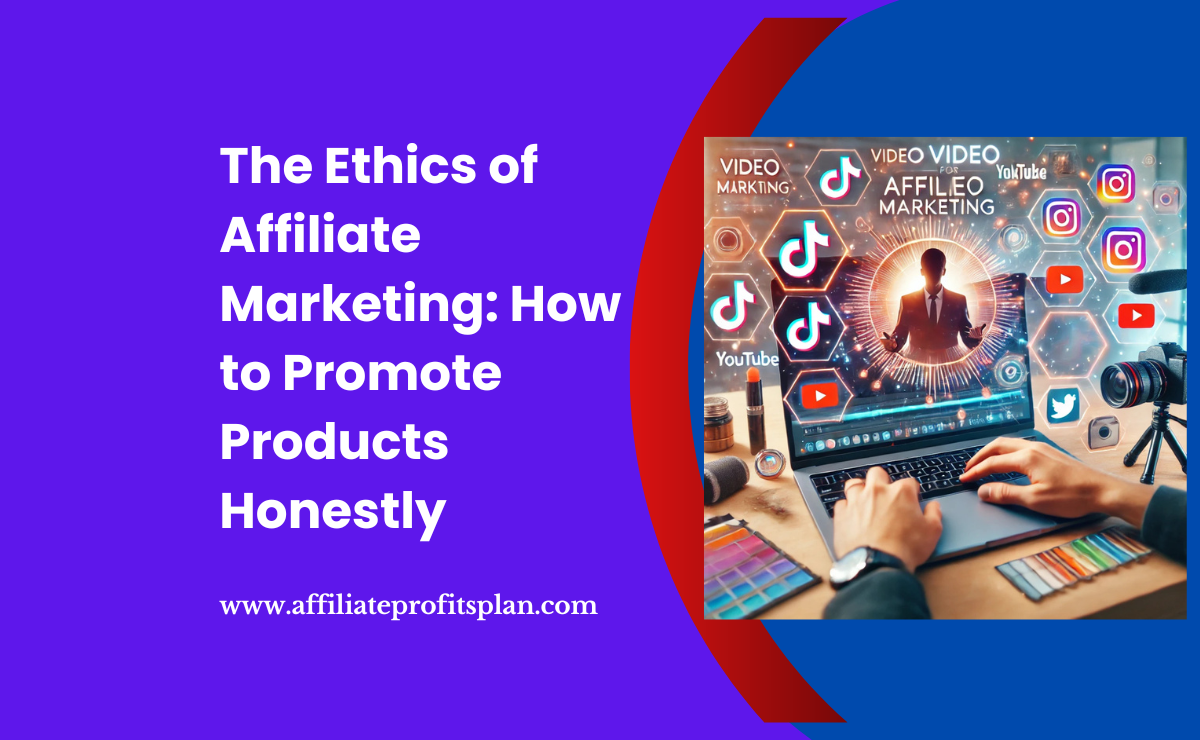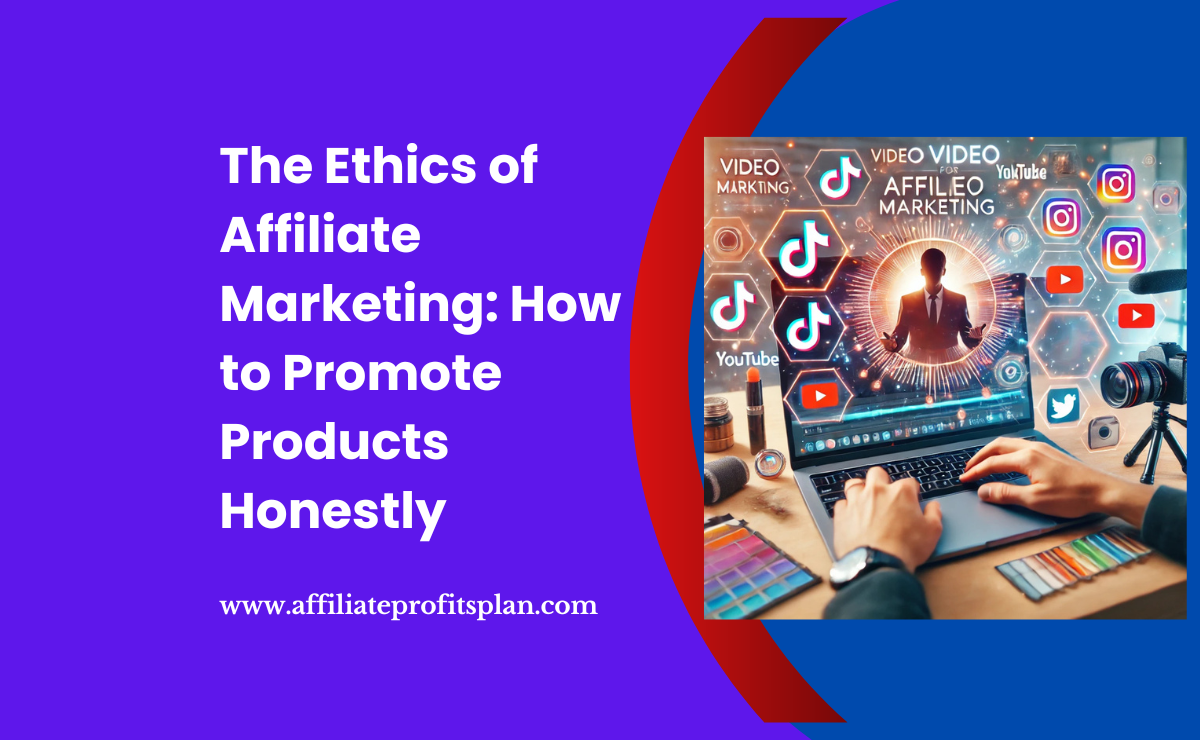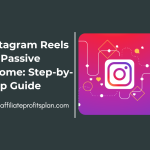Welcome to my article “The Ethics of Affiliate Marketing: How to Promote Products Honestly.”Affiliate marketing has become a popular way for people to earn income online, but with great power comes great responsibility—or at least it should! In a world where everyone’s trying to make a buck, it’s easy for marketers to take shortcuts and cut corners in ways that can erode trust with their audience. So, how do you promote products honestly without turning your blog into a constant sales pitch? It’s simple: by practicing ethical affiliate marketing.
Being transparent, authentic, and genuinely helpful not only keeps your conscience clear but also boosts your credibility with your audience. After all, no one likes being tricked into buying something they don’t need, and let’s face it, no one wants to be the affiliate marketer equivalent of a used car salesman. Whether you’re a seasoned marketer or just dipping your toes into affiliate marketing, understanding how to promote products ethically is crucial for long-term success. It’s about creating a balance where your recommendations are genuinely useful, and your audience trusts you enough to act on them—without feeling like they’ve been sold a bill of goods.
So, let’s dive into the ethics of affiliate marketing. We’ll talk about how to disclose affiliate links, why you should only promote products you believe in, and why using clickbait or making exaggerated claims is a no-go in this business. By the end of this article, you’ll know exactly how to market products with integrity—because let’s be honest, who wants to make money if it means losing trust in the process?
Access Our Proven Tested Formula for $50-$100 Daily Income – Watch This FREE Video >>

Transparency: Disclosing Affiliate Links and Relationships
Let’s start with the basics: disclosure. It might sound a bit like legal mumbo jumbo, but trust us, it’s one of the cornerstones of ethical affiliate marketing. When you include affiliate links in your content, you’re essentially getting paid for a recommendation, and just like you wouldn’t ask your best friend to borrow their car without telling them why (unless you’re a terrible friend), you shouldn’t hide the fact that you stand to make a commission from that recommendation.
Now, I know what you’re thinking: “But I don’t want to scare my audience away with a big, ugly disclaimer!” Well, fear not—disclosures don’t have to be a dealbreaker. In fact, being upfront about your affiliate links can actually work in your favor. By clearly stating that you’re using affiliate links, you show that you’re transparent and trustworthy, and most importantly, you’re building a relationship with your audience based on honesty. Remember, your audience is smarter than you think. People appreciate honesty, and while you might lose a click or two, you’ll gain the respect and loyalty of the people who value integrity.
So, how do you disclose? There’s no need for a 10-paragraph novel—keep it simple. Phrases like “This post contains affiliate links, which means I may earn a small commission at no extra cost to you” work wonders. And don’t just throw it in at the end of your post and hope no one notices! You can include it at the beginning, or better yet, right next to the link itself. Make it clear that you’re upfront about it and proud of it, because in affiliate marketing, transparency is your best friend.
Ultimately, disclosure isn’t just about complying with laws (although it is required by the FTC); it’s about fostering an environment where your audience feels confident in your recommendations. And, let’s be honest, who wouldn’t rather buy from someone they trust, even if it means they might lose a small commission in the process?
Promoting Products You Truly Believe In
If there’s one rule that should guide your affiliate marketing journey, it’s this: never promote anything you wouldn’t use yourself. Sounds simple, right? But you’d be surprised how many affiliate marketers get tempted by shiny commissions and end up promoting products they wouldn’t touch with a ten-foot pole. It’s like trying to sell a hotdog to a vegetarian—no matter how great the hotdog is, it’s just not going to work for that particular customer. The same goes for your audience. If you wouldn’t use a product, don’t waste your time promoting it.
You see, when you promote products you truly believe in, the whole process feels a lot more natural—and frankly, a lot less sleazy. Think about it: if you’re genuinely excited about a product because it works (or, dare I say, it’s actually good), that enthusiasm will shine through in your content. Your audience can sense when you’re being authentic, and they’ll trust your recommendations more than if you’re just trying to cash in on the next trending item. Plus, authenticity is contagious. When you’re passionate about something, your readers or viewers will likely get excited too—if the product fits their needs, that is.
Now, I’m not saying you have to be a die-hard fan of every product you promote. But take the time to research the products and services you’re recommending. Can you see the value in it? Would you use it in your daily life? Does it solve a real problem for your audience? If the answer is yes, then go ahead and promote it. But if you’re just promoting something because of a high commission rate or a pretty banner ad, your audience will smell that a mile away. No one wants to feel like they’re being taken for a ride, and your integrity is on the line every time you make a recommendation.
Think of it this way: Wouldn’t you rather earn a smaller commission on a product you genuinely believe in than push something just for the paycheck and risk losing the trust of your followers? It’s the difference between making a quick sale and building a sustainable, trusted relationship with your audience that can pay off for years to come. So, go ahead, get picky with what you promote—it’ll pay off in the long run!
Avoiding Over-Promotion and Misleading Claims
Here’s a little secret: less is often more—especially when it comes to affiliate marketing. It’s easy to get caught up in the excitement of earning commissions and think the more affiliate links you slap on your content, the better. But trust me, flooding your posts with a ton of affiliate links is like trying to sell a product by shouting at your audience—eventually, they’ll tune you out. Over-promotion not only feels like a hard sell, but it can also cheapen your brand.
Access Our Proven Tested Formula for $50-$100 Daily Income – Watch This FREE Video >>
Think about it—if every paragraph has a “click here to buy” link, your audience might start to feel like they’re trapped in a never-ending sales pitch. No one likes being cornered, especially by someone they trust. It’s like that one friend who always asks you to buy something when you hang out—eventually, you’ll stop hanging out with them. Similarly, when you’re constantly pushing products at your readers, they’ll feel more like a target than a valued member of your community.
Instead, focus on quality over quantity. Give your audience the content they came for, whether it’s a helpful guide, insightful review, or entertaining post. And then, only introduce affiliate links that genuinely complement the content and add value. For instance, if you’re writing a blog post on “The Best Tools for Bloggers,” only recommend tools that you actually use and love. Your readers will appreciate the honesty and feel confident that the products are worth their time—and more importantly, their money.
Now, let’s talk about misleading claims. You’ve probably seen it before—the over-the-top promises of “guaranteed success” or “earn $10,000 in a week” that are plastered all over affiliate marketing pages. It’s tempting to go down that road, especially when you’re trying to entice clicks, but here’s the thing: nothing in affiliate marketing is a guaranteed win, and making misleading claims only hurts your credibility. Your readers aren’t stupid; they can tell when you’re overhyping something, and not only will it damage your reputation, but it could also open the door to legal trouble (hello, FTC!).
Instead of exaggerating the benefits, be realistic and honest about what a product can do. If it’s a great tool but doesn’t work miracles, say so. Offer your readers an honest assessment, explaining what the product does well and where it might fall short. This transparency doesn’t just help build trust; it sets you apart as someone who values your audience’s time and money. After all, trust is the currency in affiliate marketing, and it’s worth more than any quick commission you might earn from over-promising.
So, next time you’re writing a post, ask yourself: “Am I being too pushy? Am I being honest about what this product can do?” If the answer is yes, scale it back and keep it real. Your audience will thank you for it—and so will your long-term affiliate marketing success.
Providing Value Beyond the Affiliate Link
Let’s face it: if all you’re doing is slapping affiliate links on every page and calling it a day, you’re missing the point of affiliate marketing. Sure, you’re making some cash, but are you really providing value to your audience? If you want to build a loyal following that trusts your recommendations, you’ve got to go beyond the affiliate link and deliver real value to your readers. After all, affiliate marketing isn’t just about the sale—it’s about helping people.
Think of it this way: your readers come to you because they want answers to their problems or need advice. Maybe they’re looking for the best tools for growing their blog, or perhaps they need a solution to a common issue they’re facing. So, instead of bombarding them with a list of affiliate products and hoping they’ll click, focus on solving their problems first. Provide actionable, high-quality content that educates, entertains, or inspires. If you do that well, your audience will trust you enough to consider your affiliate recommendations—not because you’re pushing them, but because you’ve already earned their trust.
For example, let’s say you’re writing a post on “How to Improve Your Blog’s SEO.” Don’t just throw in an affiliate link to an SEO tool and call it a day. Instead, offer a step-by-step guide on how to optimize a blog for SEO. Walk them through everything from keyword research to optimizing meta descriptions. Share practical tips, personal experiences, and maybe even some mistakes you’ve made along the way. Once you’ve delivered real, actionable value, you can mention the tool you use to help with SEO (that affiliate link), explaining how it fits into the process. This way, your readers feel like they’ve learned something valuable—and when you recommend a product, it feels like a natural next step rather than a hard sell.
It’s all about creating a resource that your audience will find useful and return to again and again. By offering helpful content first and weaving affiliate links in only when relevant, you’re setting yourself up for long-term success. Think about it—wouldn’t you rather have your readers look forward to your next post or video because they know you’re going to give them something valuable, rather than just shove another affiliate link in their face?
Remember, people can sense when they’re being sold to, and they don’t like it. But if they believe you’ve helped them solve a problem, they’ll feel much more comfortable clicking on an affiliate link you’ve included—because they trust you and see the value in what you’re offering. The result? A better user experience, a more engaged audience, and an increase in conversions that feels organic and genuine. Everyone wins.
So, next time you write a post, ask yourself: “Am I giving value beyond the affiliate link? Am I solving a problem first and foremost?” If the answer is no, then it’s time to shift your approach. Providing value first will not only make your affiliate marketing more ethical—it will make it more successful.
Ethical Practices in Affiliate Marketing: Avoiding Deceptive Tactics
Let’s be real for a moment: deceptive tactics might seem like a shortcut to affiliate marketing success, but they’re a one-way ticket to a tarnished reputation and a dramatic drop in trust. It’s tempting to use a little clickbait or exaggerate product claims to get those clicks and sales, but here’s the thing: when you pull the wool over your audience’s eyes, it’s only a matter of time before they catch on. And once they do, they won’t hesitate to click unsubscribe or unfollow. So, how do you stay on the straight and narrow? Simple: avoid the deceptive tactics altogether.
For starters, clickbait—those overly sensationalized headlines or promises that don’t match the content—is one of the most blatant forms of dishonesty in affiliate marketing. You know the ones: “You won’t believe what happened when I tried this product!” or “This simple hack made me $10,000 overnight!” Sure, clickbait headlines can get you the clicks in the short term, but when the content doesn’t live up to the hype, your readers will feel duped. And that? That’s a recipe for a one-way ticket to losing their trust. The truth is, no product is perfect, and no affiliate marketing strategy guarantees a windfall overnight. Be transparent about the ups and downs, and save the flashy promises for the movies.
Next up, let’s talk about exaggerating product claims. We’ve all seen it: “This app will solve ALL your problems!” or “With this tool, you’ll double your income in just 30 days!” While it might be tempting to get a little creative with the copy, it’s important to remember that making unrealistic promises is not only unethical, it’s also illegal in many cases. The FTC has clear guidelines about making claims that can’t be substantiated, and you don’t want to be caught on the wrong side of that line. Instead, be honest about what the product can and can’t do. You’re not just building an affiliate business—you’re building a reputation that will pay off long after that one sale.
And then, there’s the issue of misleading testimonials. Sometimes, affiliate marketers might share glowing reviews or fake testimonials to boost sales. This may seem like a harmless shortcut, but it’s far from it. Lying about customer experiences or fabricating testimonials to make a product seem more popular or effective than it is is a quick way to lose credibility—and potentially face legal consequences. If you’re going to use testimonials, make sure they’re genuine and accurate. If you’ve personally used the product and it worked for you, share your experience honestly. If you’re using someone else’s testimonial, ensure they’ve actually used the product and can vouch for it truthfully. Authenticity is key.
In the end, ethical affiliate marketing is about building trust—and trust doesn’t come from clickbait headlines, empty promises, or made-up stories. It comes from consistently delivering value, being honest about what products can do, and treating your audience with the respect they deserve. Sure, it might take longer to see results, but those results will be far more sustainable in the long run. And isn’t that what we all want? A business that thrives on trust, integrity, and a loyal audience who appreciates the honesty you bring to the table. So, let’s ditch the deceptive tactics and focus on the real work: helping people, building relationships, and recommending products that actually make a difference.
Conclusion
So, there you have it—affiliate marketing doesn’t have to be a shady business where the only thing that matters is the next sale. In fact, the best way to succeed in affiliate marketing is to take the high road: be transparent, only promote products you truly believe in, avoid over-promotion, and steer clear of deceptive tactics. Sure, the temptation to take shortcuts or promise the moon might be strong, but remember: building a solid, trustworthy brand is far more rewarding (and sustainable) than any quick win.
Access Our Proven Tested Formula for $50-$100 Daily Income – Watch This FREE Video >>
When you put your audience first and focus on delivering genuine value, you’re not just earning a commission—you’re creating a relationship. People come to you because they trust you, not because they’re desperate for the next shiny product you’re promoting. So, approach your affiliate marketing efforts with the goal of helping your audience, whether it’s by providing them with useful resources, solving their problems, or simply making their day a little easier.
At the end of the day, the most successful affiliate marketers are the ones who play the long game, who earn trust through honesty, and who build a reputation as a helpful resource. And when you take the time to promote products you genuinely believe in, share only what’s truly useful, and avoid misleading claims, your audience will appreciate it—and so will your bottom line.
So, take a deep breath, step back, and ask yourself: Am I providing value first? Am I promoting products with integrity? If the answer is yes, then you’re on the right track. Keep your focus on ethical practices, and your affiliate marketing efforts will not only be profitable—they’ll be something you can be proud of. After all, in the world of affiliate marketing, honesty really is the best policy.
Thanks a lot for reading my article on “The Ethics of Affiliate Marketing: How to Promote Products Honestly” till the end. Hope you’ve helped. See you with another article.










